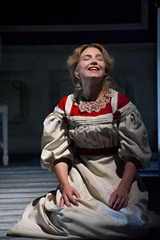| Opera Reviews | 25 April 2024 |
Scottish Opera brings new opera to the Edinburgh Festivalby Catriona Graham |
|
| Armstrong: The Lady from the Sea Scottish Opera Edinburgh International Festival August 2012 |
|
|
Sleep deprivation can make people a bit mad, so it is unsurprising that, at midsummer in high northern latitudes, people are slightly unhinged. Ellida (Claire Booth) the second wife of Dr Wangel, is for ever swimming in the fjord. Her vibrato replicates the shimmeriness of the 'water' music and Finn Ross's (black and white) video of sparkling, foaming water. She has two stepdaughters. Boletta (Sarah Shorter) yearns for escape. Hilde (Daire Halpin) is at the obnoxious adolescent stage - she still resents Ellida usurping the place of her dead mother, especially on this, her mother's birthday. A bundle of energy, she still enjoys playing hide and seek or tig with anyone she can persuade to join in. Boletta's former tutor Arnholm (Stephen Loges) has come on a visit - he has misinterpreted a letter from Dr Wangel, who wrote that someone was longing for him. Arnholm thinks it is Ellida, who he knew before her marriage. Wangel means Boletta, who initially is not keen. Another visitor is the artist Lyngstrand (Alexander Spragus). Hilde ridicules his artistic pretensions, and drags him off on walks. But he is already ill, and the exertions are too much for him. Heedless, Hilde doesn't even notice he has left. Then there is the Stranger (Benedict Nelson), who has come looking for Ellida. They plighted their troth to each other some years previously, and then he left on his ship. He subsequently killed a man and was believed drowned. Yet here he is, most definitely not dead. Reluctantly, Wangel gives Ellida her freedom, says she is free to go. The freedom to choose seems to break the spell of her past with the Stranger and, as the year turns, she chooses to stay instead of leaving on the ship at midnight. Armstrong's strongly melodic music shimmers when it is representing the water of the fiord and Ellida's longings, but is sprightly, even bouncy, for the domestic scenes. There are no big arias in this work, it comprises conversation in short sentences. A couple of times, there are ensembles, where all the characters sing together but as individuals - and, as such, they are spread out across the stage, each in his or her own space. Yannis Thavoris' staging is simple - a dining-room with lime-washed panelling and furniture, or a stage bare except for a bit of fence for the picnic. The sea video is projected on to the walls of the room, the furniture, the table-cloth to portray Ellida's turmoil, but most of the time Warren Letton floods the stage with daylight. Harry Fehr directs, with movement from Kally Lloyd-Jones and Derek Clark conducting players from Scottish Opera's orchestra. |
|
| Text ©
Catriona Graham Photo © Richard Campbell |

 What
does 21st century opera look and sound like? The question is posed by
Scottish Opera, which attempts an answer in four new works at the Edinburgh
International Festival. The first, The Lady from the Sea, based
on Ibsen's play, is composed by Craig Armstrong - better known for his
film scores - to a libretto by Scottish writer Zoe Strachan.
What
does 21st century opera look and sound like? The question is posed by
Scottish Opera, which attempts an answer in four new works at the Edinburgh
International Festival. The first, The Lady from the Sea, based
on Ibsen's play, is composed by Craig Armstrong - better known for his
film scores - to a libretto by Scottish writer Zoe Strachan. 





